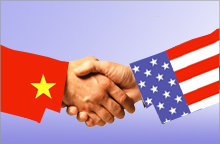
Unlike the Philippines, Vietnam Will Not Play the Pawn of the US
(China) on 24 January 2014
by Kaisheng Li (link to original)
China's relations with Vietnam are just as complex and have just as many structural contradictions as its relations with the Philippines, perhaps even more so.
Of all territorial disputes in the South China Sea, China and Vietnam share the largest overlapping claim. Vietnam claims sovereignty over practically the entire breadth of the area owned by China. Approximately half of Vietnam's gross domestic product is generated by maritime-related industries, and the ocean is now a veritable lifeline to the future for the country. Furthermore, historically there has long existed fear and anxiety toward China within Vietnam. The 1979 war only served to cement this history lesson even more firmly in the minds of the Vietnamese.
And in fact since the normalization of U.S.-Vietnam relations in 1995, ties between the countries have been slowly but quietly cultivated. Despite the cruelty and bitterness of war experienced on both sides, there is seemingly little lingering animosity from Vietnam, the self-styled victor. More importantly, there are no territorial disputes between the two countries, nor are there any other immediate threats to each others' interests.
Yet Vietnam is unlikely to become another Philippines, unlikely to become another tame pawn of the U.S. The dissimilarities between the two Asian-Pacific nations are too great, and Vietnam has a far more complex relationship with the U.S.
Under a long period of Western colonial rule, the Philippines absorbed English and Christianity, and its relationship with the U.S. both historically and culturally has been far deeper than that of Vietnam. Vietnam's culture is still fundamentally Eastern, with deep roots in Confucianism and Buddhism. And economically it maintains extremely close ties with China. Although the U.S. is the largest export market for Vietnamese goods, Vietnam imports more from China than from any other country. Although Vietnam has long grumbled about its trade imbalance with China, the fact is that without its neighbor, the Vietnamese economy would grind to a halt.
Even more importantly, the ruling Vietnamese Communist Party has always been separated from the U.S. by a political and ideological gulf. While the U.S. adheres to realism in terms of national interests, it retains an innate ardor for spreading Western values.
This dichotomy will likely continue to exist for some time. On one hand, the Vietnamese Communist Party has been relatively successful in developing its economy and will be able to maintain its ruling position well into the future. On the other hand, it is highly unlikely that democracy and human rights will vanish from the U.S. diplomatic agenda. This has decided the long-term nature of the game.
This point prompts Vietnam to view China as a valuable friend and ally, as both sides will need to band together to face the challenges from the West, and the U.S. in particular.
These factors make Vietnam a two-faced coin. In territorial disputes and geopolitical games, it welcomes the U.S. with open arms. But when it comes to competing political systems and ideologies, the U.S. will only get the cold shoulder. With China, Vietnam's attitude is precisely the opposite. So for some time yet, Vietnam will neither become a docile ally of the U.S., nor will it remain close to China, but rather vacillate somewhere in between.
The author is an associate research fellow at the Shanghai Academy of Social Science's Institute of International Relations.
